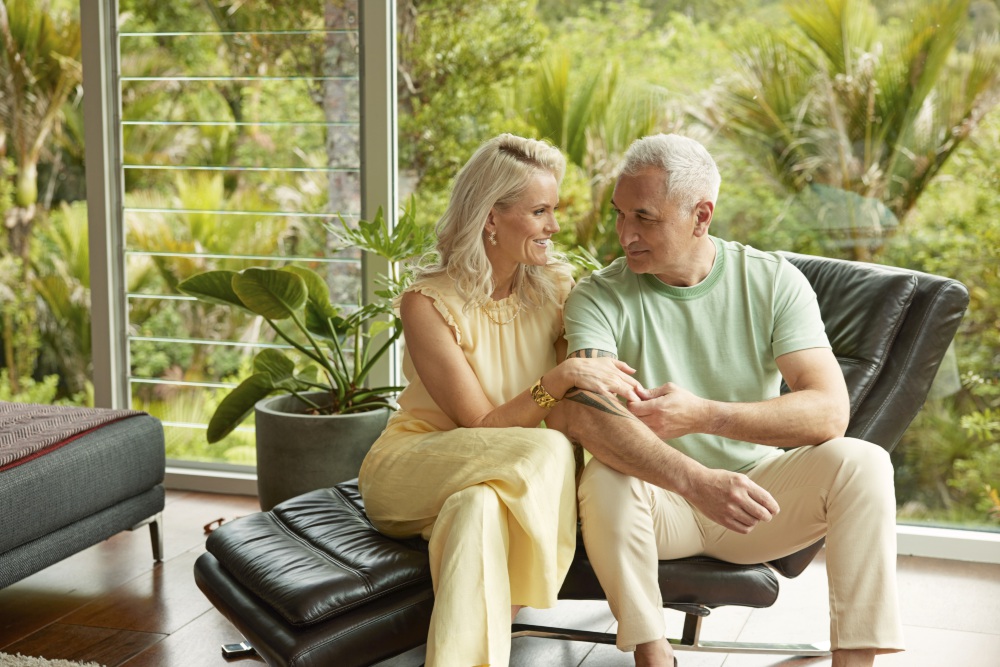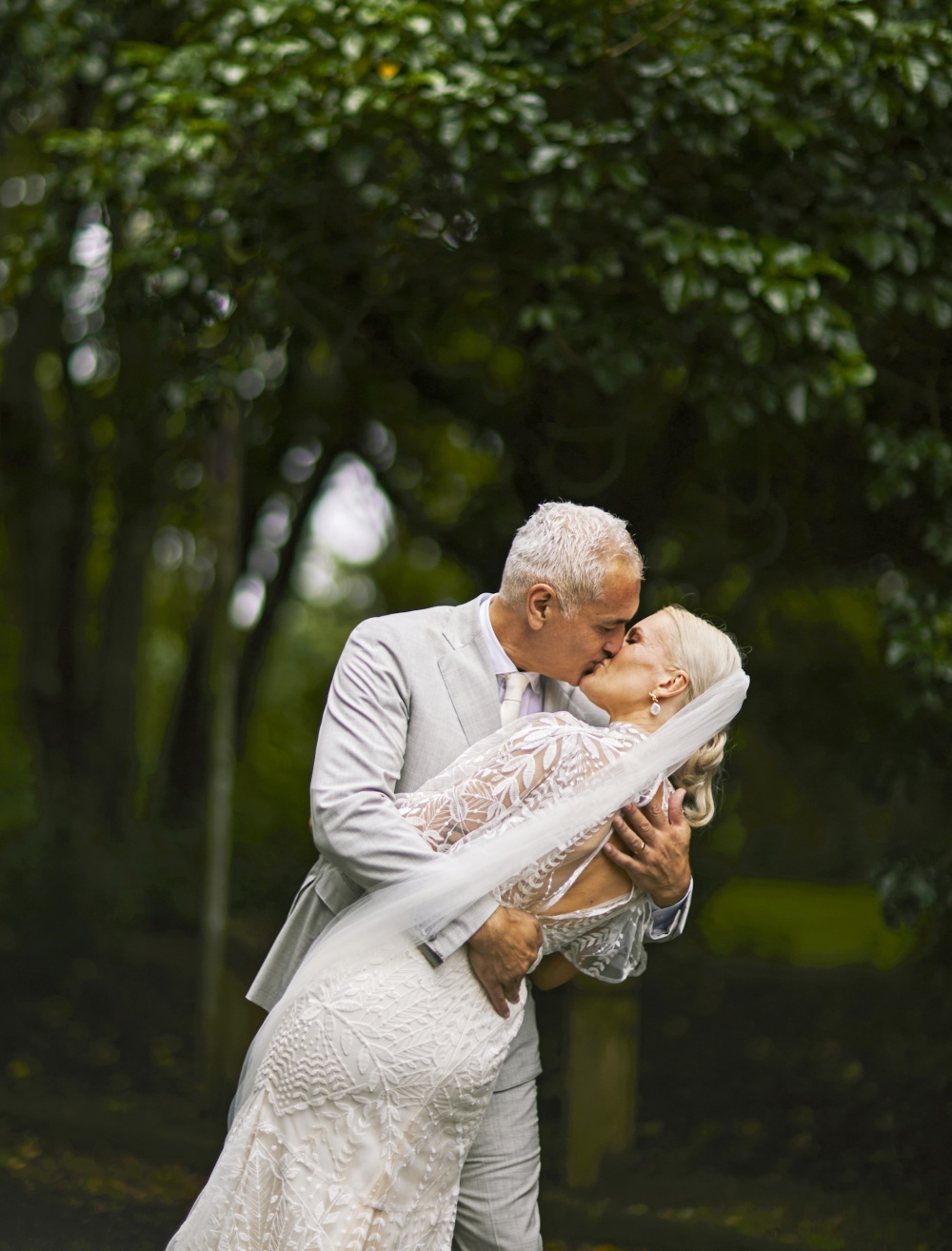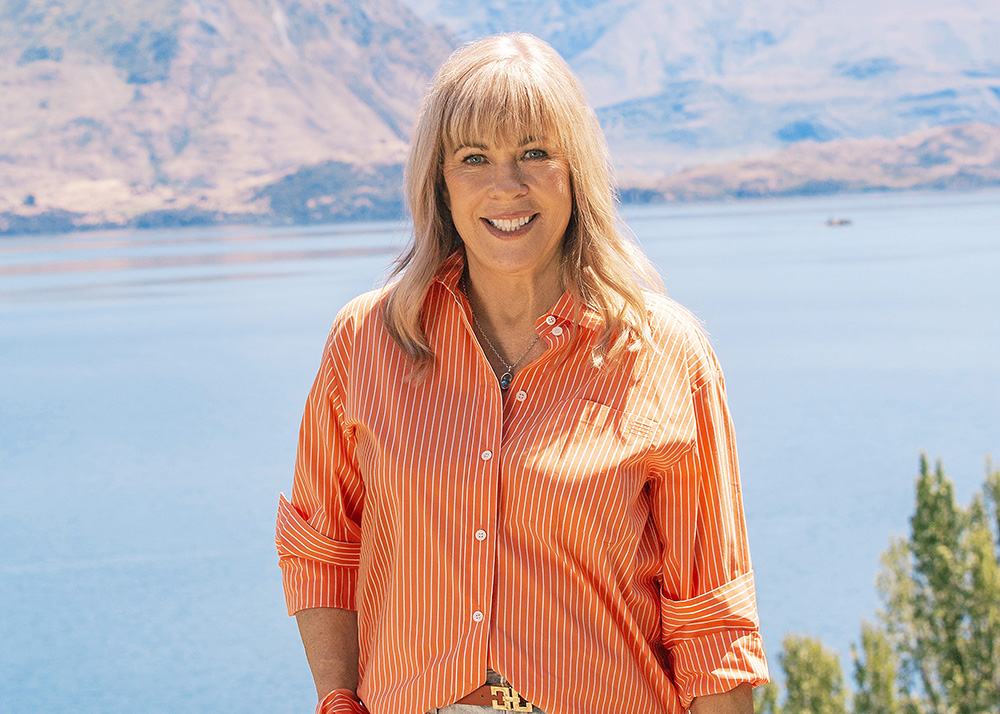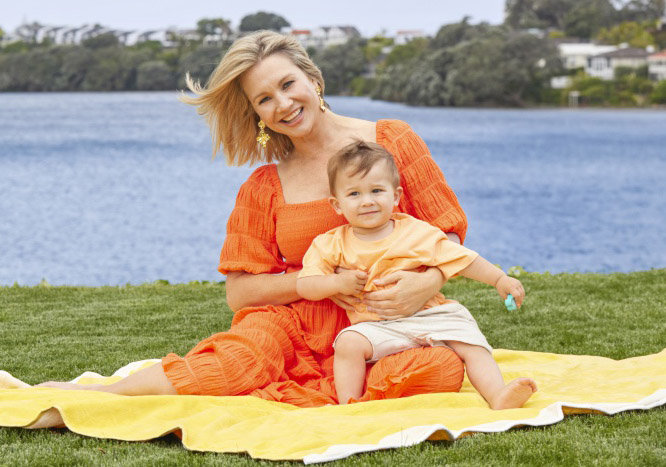A little less than a year after their stunning wedding, the scene at Mike McRoberts and Heidi Ettema’s bush-clad West Auckland house couldn’t be more different.
There’s power and water for a start. And the only reminder of the floods that threatened to disrupt their big day are several orange traffic cones warning of a collapsed road nearby.
But the challenges in the lead-up to their wedding were nothing compared to Mike, 58, throwing himself into a year’s full-time, full-immersion te reo Māori study a mere three days after saying “I do”.

He’d attend class from 9am to 3pm at Te Wānanga Takiura, a private tertiary institute, before heading to work anchoring Newshub Live At 6pm. To describe their first year of marriage as “hectic” is a bit of an understatement, the relaxed pair agree with wry smiles.
“While it’s been tough, in terms of not seeing each other much and the emotional toll of Mike’s studies, it’s been incredible to see him connect with his whakapapa and develop a more assuredness,” shares Heidi, 38.
“There was also a beautiful connection made with other students in that class who called him Pāpā Mike from the outset. They were from all walks of life, some teenagers and some older than Mike…”
“Not that many!” the newsreader insists.
“…and the way they all cared for each other was so special,” continues Heidi. “I’m so proud that he did this. Giving up is not really an option for him. I would have bailed on week one!”

The popular broadcaster, who has a Pākehā mother and a Māori dad, was raised in an English-speaking environment in Christchurch, largely disconnected from his culture. Learning te reo was not just something he “wanted to do, but something I needed to do” after feeling shame as a Māori who didn’t know his language. Mike used to experience anxiety about even saying “kia ora” on screen in case he got it wrong.
When asked what’s scariest – reporting from war zones, dating again in your fifties or starting a full-immersion class – Mike bursts out laughing and insists it’s the latter.
“I’ve done the trifecta of getting out of my comfort zone, haven’t I?” grins Mike. “But learning te reo Māori has been the greatest challenge because there’s so much emotion tied up with the whakamā [embarrassment] of not knowing it.
“And then I had these expectations that it’s going to be easy and it’s not. I worked really, really hard every day and every weekend. It didn’t come naturally. Throughout the year, students had to do a series of speeches called whakapuaki, where each one gets progressively longer and the last one is an hour long.
“We had to do one on whakataukī, Māori proverbs, so I found one which really resonated with me: He punga i mau ai, which means ‘the anchor that holds me’. Because when I started the year, I had what I thought were two anchors: my whānau, including Heidi, and my work.
“As 2023 went on, I discovered more anchors – my whakapapa, my reo, waiata [song] and karakia [prayer]. The more anchors you have, it doesn’t matter how rough the waters are, you’re held steady. I feel that now.”
With the newlyweds not able to spend much time together, Mike decided to use his new-found skills to send Heidi romantic messages.

Mike credits Heidi for getting him through: “She’s amazing.”
“One of the first text messages that I sent to her was, ‘E mokemoke ana ahau ki e koe,’ which means, ‘I’m lonely for you.’ I loved discovering how lyrical and poetic different words are.”
“Now he sends me full text messages in te reo Māori,” smiles Heidi, who has been learning online too. “I can pick out and understand different words, and the rest goes into Te Aka Māori Dictionary to be translated.”
Mike, who is of Ngāti Kahungunu descent, admits that while there were times on the course where he felt “broken” and unsure if he would graduate, he forged on.
“Halfway through the year, my uncle died,” tells Mike. “He was very much the kaumātua [respected elder] of our whānau. We went to the marae for his tangihanga [funeral] and I spoke on the marae – not that well, but I could – when my father couldn’t.
“That tohu, that sign, showed me I was on the right track and to keep going. It was one of the reasons I did the course – to go back for whānau events and not just be there to dry the dishes.”
Now the Three presenter reckons he’s “pretty close” to being fluent after graduating in December. It was an emotional day, with his dad Mac, 76, his brothers Kerry and Jayson, and his two children, Ben, 23 and Maia, 21, proudly cheering him on.

A proud moment with (from left) son Ben, brother Kerry, dad Mac and brother Jayson.
While he hasn’t started dreaming in te reo just yet – apparently a sign that someone is starting to internalise the vocabulary – there were times he’d go straight from class to the studio and momentarily struggle with the language changeover.
“The first thing I do when I get to work is read the promos and I’d be looking at the words, going, ‘What is that? Oh!’ It was hard to switch over to English sometimes. I still translate a lot in my head. It made me appreciate my role as a presenter more too because when you can excel at a particular language but you’re struggling with another, it makes you grateful where you came from.”
Learning te reo and researching his lineage has helped Mike to not only piece together his identity, but also deconstruct a western framework. The journalist views things with a different lens now.
And at a time when te reo usage is coming under scrutiny by the new government, Mike says he’d hate to see the language go backwards.
“I’m optimistic that it will continue to thrive,” asserts Mike. “There is enough energy, drive and understanding – and not just from Māori – that it’s important. You’ve just got to go into kindergartens and schools – and I spent a bit of my class time at a bilingual unit on the North Shore – to see that every kid knows their pepeha [traditional introduction].
“It’s a beautiful thing for every child to have an understanding of where they come from and a sense of belonging. Those sorts of things aren’t going to go away. If anything, they’re going to get stronger.”
Mike’s own reconnection to his culture was what eventually led to his decision to propose to Heidi, a music publicist who looks after Kiwi country music star Kaylee Bell and international artists such as Kylie Minogue.
The pair first met in 2017, when they were introduced by mutual friends at a gig. While they immediately hit it off and shared many interests – a vegan lifestyle, music, running and hiking – they were just friends at first, only getting together two years later.
“I feel really thankful for her,” beams Mike. “I couldn’t have done last year without Heidi’s support. She’s amazing.”

Heidi adds, “We’re really big on the concept of team. There were countless times last year when Mike was down – not necessarily mentally, but just struggling a bit. A lot of that time, it was me going, ‘Come on. You can do this!’ and equally vice versa.”
Now as they celebrate their first wedding anniversary on 3 February with a trip to Tasmania – “We wanted to go somewhere we’d never been,” explains Heidi – the couple are looking forward to time spent doing things around the home and enrolling in further online te reo courses to keep Mike’s momentum going.
They’re also completely pumped for the league season to start again. “We honestly can’t wait – up the Wahs!” shouts Heidi.
“Respite for us comes in the form of going to a Warriors game,” laughs Mike. “We’re committed fans. You just don’t want to be sitting next to Heidi when they’re losing!”

Heidi scores points for being a good sport!
Work-wise, he agrees he’s in a strong position to cover Māori issues for Newshub and already has a couple of stories lined up that he initiated.
“I would have run a mile from those stories in the past just because I felt like a fraud,” explains Mike. “I emceed a conference recently in Hastings and did the whaikōrero [formal speech] in front of members of my iwi and felt so thrilled to be able to do that. So I’m looking forward to more of those opportunities too.
“Starting this journey has been so massive for me because I’ve had to be vulnerable and let go of a lot of things. I really am a different person now because of it – it’s been life-changing.”
 Michael Rooke
Michael Rooke

